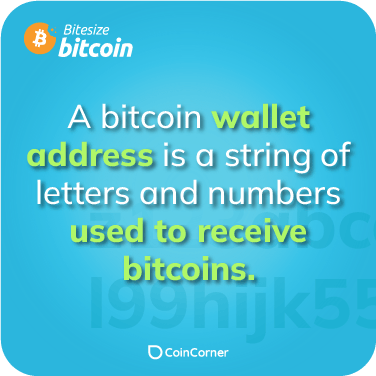What is a bitcoin wallet?

In the world of Bitcoin, an address is a fundamental component and a vital tool for receiving and sending bitcoins. It's essentially a string of letters and numbers that serves as a unique identifier or location for Bitcoin transactions. Let's delve into the details of how addresses work and their significance in the Bitcoin ecosystem:
A typical Bitcoin address is represented as a long string of alphanumeric characters and consists of the following components:
Prefix:
Some addresses might start with a prefix such as "1" or "3" (for Bitcoin on the mainnet) or "bc1" (for Segregated Witness or bech32 addresses). These prefixes help users and software distinguish between different types of Bitcoin addresses and networks.
Encoded Public Key:
The core part of a Bitcoin address is an encoded form of a public key. This public key is derived from the corresponding private key using cryptographic algorithms. The encoded public key is represented as a series of letters and numbers.
Checksum:
To enhance address integrity and prevent typographical errors, a checksum is added to the address. This checksum is a unique set of characters at the end of the address that verifies the address's validity.
Receiving Bitcoins:
Bitcoin addresses serve as a destination for receiving bitcoins. When someone wants to send you bitcoins, they input your Bitcoin address into their wallet or payment system. The sender's wallet software then creates a transaction that designates your address as the recipient.
Ownership Verification:
Your Bitcoin address is associated with your private key, which you must keep secure and confidential. It acts as a cryptographic proof of ownership. To spend or transfer bitcoins from your address, you need to use your private key to create a digital signature, demonstrating that you have the right to control the bitcoins associated with that address.
Transaction History:
Every Bitcoin transaction is recorded on the public ledger, the blockchain. This includes the sender's address, recipient's address, the amount transferred, and a timestamp. Anyone can view the transaction history of a Bitcoin address by searching it on a blockchain explorer.
Security and Privacy:
Bitcoin addresses are pseudonymous, meaning they don't reveal the identity of the address owner. They provide a layer of privacy as they're not directly tied to personal information. However, it's essential to practice good security hygiene to protect the link between your address and your identity.
Change Addresses:
In Bitcoin transactions, a change address is often used to ensure that the unspent bitcoins from the transaction are sent back to the sender. This process enhances privacy and security. Change addresses are typically generated by wallet software.
Compatibility:
There are various types of Bitcoin addresses, including legacy addresses (starting with "1"), Segregated Witness (SegWit) addresses (starting with "3" or "bc1"), and more. These address formats serve different purposes and are used by different wallet software.
Structure of a Bitcoin Address:
A typical Bitcoin address is represented as a long string of alphanumeric characters and consists of the following components:
Prefix:
Some addresses might start with a prefix such as "1" or "3" (for Bitcoin on the mainnet) or "bc1" (for Segregated Witness or bech32 addresses). These prefixes help users and software distinguish between different types of Bitcoin addresses and networks.
Encoded Public Key:
The core part of a Bitcoin address is an encoded form of a public key. This public key is derived from the corresponding private key using cryptographic algorithms. The encoded public key is represented as a series of letters and numbers.
Checksum:
To enhance address integrity and prevent typographical errors, a checksum is added to the address. This checksum is a unique set of characters at the end of the address that verifies the address's validity.
The Role of Bitcoin Addresses:
Receiving Bitcoins:
Bitcoin addresses serve as a destination for receiving bitcoins. When someone wants to send you bitcoins, they input your Bitcoin address into their wallet or payment system. The sender's wallet software then creates a transaction that designates your address as the recipient.
Ownership Verification:
Your Bitcoin address is associated with your private key, which you must keep secure and confidential. It acts as a cryptographic proof of ownership. To spend or transfer bitcoins from your address, you need to use your private key to create a digital signature, demonstrating that you have the right to control the bitcoins associated with that address.
Transaction History:
Every Bitcoin transaction is recorded on the public ledger, the blockchain. This includes the sender's address, recipient's address, the amount transferred, and a timestamp. Anyone can view the transaction history of a Bitcoin address by searching it on a blockchain explorer.
Security and Privacy:
Bitcoin addresses are pseudonymous, meaning they don't reveal the identity of the address owner. They provide a layer of privacy as they're not directly tied to personal information. However, it's essential to practice good security hygiene to protect the link between your address and your identity.
Change Addresses:
In Bitcoin transactions, a change address is often used to ensure that the unspent bitcoins from the transaction are sent back to the sender. This process enhances privacy and security. Change addresses are typically generated by wallet software.
Compatibility:
There are various types of Bitcoin addresses, including legacy addresses (starting with "1"), Segregated Witness (SegWit) addresses (starting with "3" or "bc1"), and more. These address formats serve different purposes and are used by different wallet software.
Share this fact:





